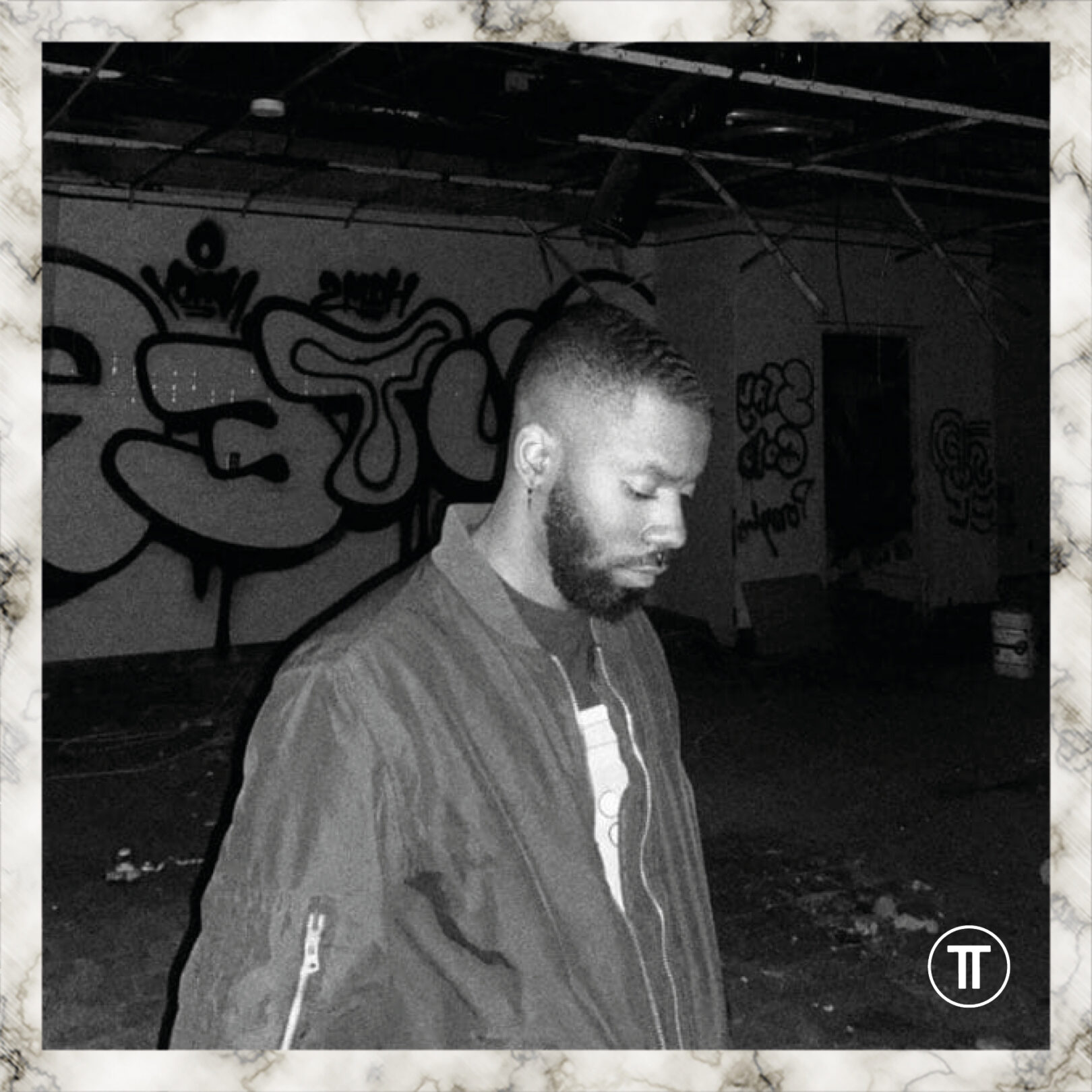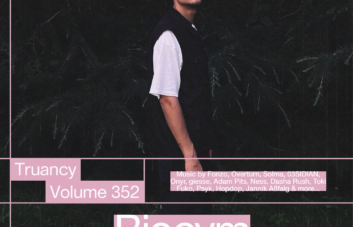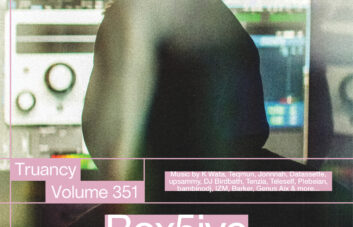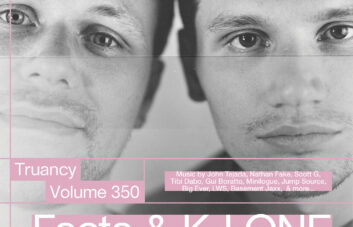Over the past few years, D. Strange has created a series of succinctly singular electro releases. His sound is crisp machine music with soul, full of a relentless darkness but not without hope. Following a recent move from Indianapolis to Chicago, the DJ and producer spoke to us about the difference between the two cities, the politics of his music, the art of sampling and more. His Truancy Volume is an intense hour of power that runs perfectly down the blurred line that exists between techno and electro, offering fury, frenzy and abandon.
How are you? “I’m doing great. How are you doing, man?”
Not too bad. The weather was really hot by Irish standards for a couple of weeks, then yesterday just started to rain, and it’s pretty much rained on-and-off since. So, it’s a relief but also disappointment at the same time. “Yeah, man. It’s been hot as hell here in Chicago. It’s been extremely hot every single day.”
I was in Chicago for a summer once, and oh my God, it was 102 most days. So, are you based in Chicago now? “Yeah, yeah. I actually just moved here about a month and a half ago.”
Okay, because I thought you were in Indianapolis – was that right? “Yeah, that’s right. I’ve been in Indianapolis for most of my life. But yeah, I’m in Chicago now. I’m going to school right now, but I also moved here just for more opportunities. I love my community out in Indy, but you know, you got to dive into deeper waters.”
Of course, yeah. What is the community like where you’re from? “In Indianapolis it’s real close-knit. There’s this really sick weirdo punk scene. There’s people out there doing techno, house. Me and my homies did this party called Plex. We did that for a good six or seven months, right before COVID hit. And those were just warehouse raves.”
So I guess that’s obviously not happened for quite a while? “Hell no. I think right when things got lifted a little bit, we had a little rooftop party. But you know, it didn’t necessarily tap into the energy that we had pushed towards right before I got here.”

What was it like for you when COVID hit? Were you playing out a lot, doing a lot of gigs back then? “Yeah, I was playing out a good amount. I had a couple of residencies in the city. I played with one of my good friends, Noncompliant. She had a techno night called ‘Sanctuary’ that I would play pretty regularly. So it was that and a couple other things I was playing out that came to a screeching halt.”
So what did you do? Did you do any livestreams? “No, I had no choice but to dive deeper, man. You know, I took the opportunity to with all the extra time to just explore different pieces of gear and just make as much music as humanly possible, really. When I had time to, because I was still working.”
All techno and electronic, that kind of thing? Or did you try other styles or sounds? “Oh, I mean, you know, that’s my bread and butter, but I’m always making different stuff. And sometimes I sit down and just make a beat. Make shit that I want to hear, really.”
Right, okay – because it’s almost cliché to say that people made a lot of ambient records during the pandemic. Did you find yourself doing anything like that – making ambient music? “Oh yeah! Actually yeah, funnily enough. Sometimes it’s too easy just to you know, wake up, there’s nowhere to go. And you just, you know, you want that space, that vibe, for lack of a better term.”
You’ve got a new release out now. Previously, you released yourself – what led to teaming up with a label this time? Was it just for getting it on to vinyl, or something else other than that? “I mean, I’ve had my respect for Tram Planet for a couple of years. I’ve always liked the shit that they put out. And you know, DZee from the label hit me up. I said that it felt like a good time to do it. I had all these tracks I’ve been sitting on, it felt pretty cohesive, and why not try to get it out to more people?”
That makes sense, and obviously it’s just out, but are you happy with the release as it has happened? “Oh, yeah, absolutely. It took a little bit longer than I thought. But it was expected given how backed up the plants were.”
Oh, yeah, it’s crazy. I’m on one record promo list where I actually get records in the mail. I got a record from them last week, and it actually came out digitally last year, but it’s only coming out on record now for some reason. So you’re doing well. “It’s kind of funny, though. I mean, you know, that record just came out. But I had submitted those tracks to the label back in November of last year. So it was a good amount of time in-between, where we’re in limbo, kind of just waiting on the plants to give us an idea when it was going to actually come.”
I wanted to ask about “Ghost of Kashif” because the tracks have really interesting titles, and this one stood out to me. Does that have any significance? “Yeah, I’m just going to pull the curtain back a little bit, really. I was listening to Kashif because it was his birthday. Kashif was this ‘80s funk producer, singer-songwriter. He’s written fire hits for Whitney Houston and Janet Jackson and shit, back in the ‘80s. But I heard this really interesting, kind of synth-noodling thing that was just thrown in at the end of the song. And it called to me. So, I grabbed it, and completely warped it. It was kind of an homage to him and his genius, really.”
That’s amazing. You play with a lot of sounds, but that track just felt a lot more melodic than some of your other stuff that might be more spacey and robotic, almost. I don’t mean that in a bad way at all. “Yeah, yeah, I know what you’re saying. Other stuff is a little bit more like percussive, heavy, robotic, machine-like music.”
Another thing I wanted to ask about, I suppose it’s tied in with titles. This is going back a little bit, but I think the first thing I ever heard from you was the track “Philando”. I wanted to ask about politics in your music – if that is political at all, but that’s the wrong word to use… “That’s totally fine. I like to think, to a certain extent, whatever you say, whatever is out in the world, can be received in a political way. And specifically art. I don’t believe art needs to be inherently political, but I do feel that it is an artist’s duty to be an honest reflection of what’s happening in the world. And as you know, as a black person in the United States, it’s kind of hard to ignore. It’s pretty much impossible to ignore. So, it’s always going to come out in my music – the things that I’ve looked at and consume on a day-to-day basis. I try not to consume everything, obviously. But you know.”
What’s the difference between Indianapolis and Chicago? I’ve never been to Indianapolis, and well, I’m white so I would have a very different experience anyway, but have you noticed any difference in what life is like between the two? “I mean, really the main difference between here and Indianapolis – I mean, there’s a pretty big link between all cities in the region, of this specific region in the Midwest. Like Detroit, Chicago, Indianapolis. You can even lump Louisville, Kentucky in there sometimes, too. But like, I would say, really, the only difference is just resources. As far as the energy you get from the city, it’s pretty similar, the people are pretty similar.”
“I feel like in a bigger city that people are always going to be a little bit more aggressive, though. Or a little bit more upfront. And that’s what I like about Chicago. There’s no bullshit or nothing. You just have to be a little bit [more] wary than you would be in a smaller town like Indianapolis, where everyone’s kind of, you know – they’re like: “We’re small, so we have to stick together!” Chicago’s like: “Well, I don’t fucking know you, so I don’t give a fuck about what you’re doing!” That shit. Which is fine. As I’ve gotten older, I’ve just understood that not everyone’s completely open. Sometimes you’ve got to be guarded because sometimes, people will just take shit. I don’t know what people’s intentions are.”
Have you made any inroads into any sort of scene in Chicago? I mean, have you made any connections there or are you just focused on school? “I mean, I’ve been checking out the scene like at large as of late, you know. I’ve checked out the Smart Bar a couple of times. Ron Trent and Chez Damier came to Smart Bar, I think it was the first week that they reopened.”
What a way to reopen. “I know, yeah. I think it was Honey Dijon the night before, it was pretty insane. But I had to work both of those nights. I can only choose one of these nights to go out, because, I mean, working both of those nights. I was like, well, I’m in Chicago and I think I should see Ron Trent, and I had been in the city for maybe two or three weeks. Still, you know, looking for places and stuff, but I was just like, I have to do this. Yeah, it’s just one of those things. As far as the scene, I’ve been linking up with homies. I already had a good amount of friends in the area. And I’ve just been slowly but surely checking things out. Diving into the record stores as well. There’s some great record stores out here.”
Where have you been going? The only ones I know of are Gramaphone and Reckless. “Yeah, Gramaphone is obviously quintessential dance. Found some cuts at this place, Wild Prairie too.”
Do you see yourself using more samples in your music? Or is this just purely for DJing purposes? “Most of the time, when I go to a record store, I’m usually just looking for records to play out. I occasionally get something real weird to like sample. But the way that I sample is that I find a record that I really like, and I find the most almost-useless clip in that, and I completely break it for just like a sound base. I like the other people who are really good at flipping samples the right way. I’m not really good at that without making it sound just corny and reproduced.”
That’s really interesting. In some ways, that’s more interesting. Recently, I’ve been listening to all the stuff that Jay Z tracks sample and some of them are literally just– “It’s not even like a sample. It’s almost like karaoke at a certain point.”
That’s exactly what it is. But then you’ve got other things where there’s a tiny, tiny break from the middle of the song, and that’s just the whole beat. It’s just that bar, so you’d almost miss it if you just listened to the original song, if you didn’t know what you’re looking for. “Yeah, I remember – I think it was Mobb Deep, “Shook Ones”. Havoc, he flipped this old jazz sample. I can’t remember who it was. I want to guess Herbie [Hancock]. But he pitched it so much and he played it in such a weird way that it didn’t even sound like the sample. And I feel like that’s the art to a sample. Because at the end of the day, a keyboard, a synth, is technically a sample. It’s a reproduced frequency. So, no matter what you’re playing, it’s technically a sample. But as far as I’m concerned, there’s obviously artful ways to flip samples and that’s a very complicated thing. It all comes to power dynamics and shit like that. At the end of the day, my respect goes to people who take a sample and do something completely different with it.”
Yeah, I hear you. So, I wanted to know, what’s your approach for your mix for us? “I’m getting it going right now. I have this way of approaching things where I have like four or five different hypothetical mixes in my various playlists and stuff. So, I’m gearing up to do that mix for you guys. But yeah, the approach is always just trying to connect the dots between all the different energies. Everything that I love. Just deep sounds, hard sounds. I like it all to be there. I like things to ebb and flow, in a way that doesn’t seem so formulaic.”
How do you make it interesting, especially when there are so many mixes out there at any given time as well? “I mean, I guess interesting is pretty subjective. But as far as I’m concerned, a real bare-bones way of describing it is that I like to hear different percussive elements. Like, fucking move the kick somewhere else. I don’t know, I just like simple [things] that people would never think about. It’s really obvious that those tracks are all using the same texture – then it’s like, break that texture, break that energy for a second. Let it breathe. Everything doesn’t have to be perfectly stitched together. Sometimes you can just throw it on there even in a tasteful way.”
When you hear someone bring a track in at the wrong time, on the wrong beat, it can really throw you. But someone said to me that sometimes they like to do that deliberately, as an aesthetic choice, to make things more interesting. Maybe that’s not entirely what you’re saying, but it’s something along those lines. “You know what’s crazy enough is that I actually noticed that one time. I was listening to an old Omar-S mix, one of those random little CD mixes. And I noticed that one of his tracks, he did throw it in on the downbeat. But the longer it mixed together – he let the mix ride long enough where you really couldn’t tell anymore. And that’s the thing – if you’re solid with your mixing skills and you let the tracks ebb and flow the right way, you can get away with stuff like that. It just depends on the context and shit.”
What’s your situation in terms of gigs upcoming, or is it too soon to talk about that kind of thing? “No, I mean, I got some things coming up, the Formula party in Detroit and this new black techno party Miss Twink USA is putting on here in Chicago.”
Do you prefer playing in smaller cities? Or do you prefer big cities? Or do you just play where you can play? “Really, it’s not as much as the city as it is the environment. I always want to play somewhere where they at least have a semblance of an idea what I’m doing. Because you know, put me in an environment where the sound’s off, or everyone else is playing tech house or something, it’s going to be a bad experience for everyone. But like, you know, Columbus, New York, as long as that sounds good, and the people are good, I’m down for whatever.”
That’s a good attitude to have. Have you had all your vaccinations and everything? “Yeah, absolutely. Once they let those go, I was like, okay. I wanted to do something eventually… I haven’t left the country in a minute.”
Out of curiosity, what are you studying? “Sound engineering. Audio. I’m at this place called SAE Institute. Mixing and mastering. I eventually want to get into doing scores and stuff. It’s just like, trying to, you know, take a little bit of a professional route, so I can have that under my belt, so I don’t have to slave away in a kitchen post-30.”
Just to go back to scores you mentioned. Do you have any scores that have really impressed you lately? “Yeah, of course. I would say Oneohtrix Point Never’s score for Good Time. The score for Uncut Gems is really good, too. I didn’t really like Tenet, but the score for it was really sick. I would say my favourite score of all the time is Vangelis’ score for Blade Runner.”
Actually, I wasn’t going to talk to you about your record Off World, but I presume that was heavily influenced by Blade Runner? “Yeah, heavily. Very much so. I can’t count how many times I’ve seen it, it’s kind of insane. It was one of those movies that I’d just throw on every night, it helps me sleep. Not because it’s boring, but you know, because I’ve seen it so many times. It’s a comfort thing.”
Tracklist:
Jay Denham – One Drop
K-Hand – Central
2 Lanes – Charger Muzik
Adam Jay – Bruiting The Drum
Max Watts – Reverting
Cari Lekebusch – Swedish Foxes
J. Tijn – Armbar
Burial – Archangel (quest?onmarc Extended Bootleg)
ZULI – Trigger Finger
Endlec – Glory Days
Robert Armani – Grind
Olivier Kaiser – Share the Fun
Blackman – Fear Of My Own Brother
Verbos – Headfuck
Pablo R. Ruiz – Bad Hombre
The Unknown Soldier – Babylon’s Gifts
Adam X – Unreleased Acid from 1994
Hiroaki Iizuka – Living In The Dark
Makaton – Goatbone ( Regis & Female Remix )
Richard Hohlburn – Dollar Bill Walk With God We Trust
D. Strange – Feedback
D. Strange: Soundcloud, Bandcamp




